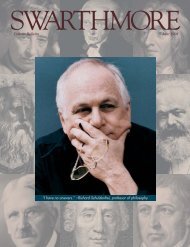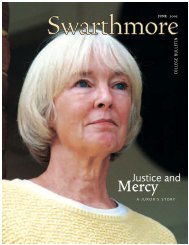to a farce or a tragedy or perhaps both. Knowledge will forever govern ignorance, and a people who meanwas first hired as a receptionist in 1977—andat NBC and ABC. She too owns a Peabodyand an Emmy, both awarded in 1990 for theMTV documentary Decade, which chronicledthe 1980s.Producer Bryan Myers describes thisweek’s program, which features countrymusic legend Willie Nelson and his pet project,a brand of bio-diesel fuel marketed by acompany he partly owns. “BioWillie,” ablend of cottonseed oil and regular dieselfuel, can be used in any diesel engine. TheNOW report will follow it “from plow topump,” Myers says, fielding questions thatare both technical and editorial. The atmosphereis collegial, with discussion of a rangeof related issues, including ethanol and therole that Big Oil might play in the bio-fuelsindustry. Myers lists some of the potentiallynegative consequences of bio-fuels, such asthe environmental impact of clearing moreacres to grow crops for fuel.Back in her office, Spanninger talks aboutthe changes she’s seen during her career. AtNOW, she supervises five production teams,developing reports that can take as little as 6days or as long as 6 months to get from ideato air. The environment at PBS is more conduciveto this flexible pace—like it used to beat the commercial networks.When she started in news production inthe early 1980s, Spanninger says the BigThree news divisions “weren’t expected to beprofit centers.” At the CBS Reports documentarynews program, where she first encounteredMoyers, “we could take a year to do astory that was important. There was no ratingspressure. We weren’t expected to holdour own against the Academy Awards andthe basketball playoffs.”But, she says, the commercial success ofCBS’s 60 Minutes, which became television’smost-watched show in 1979–1980, changedthe news business by spawning “a wholeindustry of newsmagazines” that were alsoexpected to make money.At the same time, the networks wereabsorbed by larger corporations such as GeneralElectric, which bought RCA/NBC in1985, and Capital Cities Communications,which took over ABC the same year. Moreand more news divisions “had no gut fornews” and “there was a slow but steadyerosion of the quality of news on TV,”Spanninger says.In public broadcasting, it seemed thatthere could be a different model. PBS, whichprovides programming for 300 member stations,has a solid history of public-affairsshows such as Washington Week in Review,NewsHour, Frontline, and the documentaryprogram POV. Moyers’ contributions haveincluded Bill Moyers’ Journal and such deepthinkingseries as The Power of Myth, Healingand the Mind, and Genesis. (In April, Moyerswill come out of retirement to revive BillMoyers’ Journal.)Brancaccio asserts that PBS is the mosttrusted media brand in the nation. “It’s selfevidentthat we aren’t doing things like[NOW] for ratings,” he says. “It has to havesome higher purpose.” Still, he says, trust ina free and open press has fallen in recent“IN-DEPTH COVERAGEOF ANYTHING—LET ALONE THEPROBLEMS REALPEOPLE FACEDAY-TO-DAY—IS ASSCARCE AS SEX,VIOLENCE, ANDVOYEURISM AREPERVASIVE,”MOYERS SAYS.years. He cites a recent poll conducted by theBBC, Reuters, and the Media Center, whichfound that although an average of 65 percentof people in the 10 countries surveyedthought that the media accurately reports thenews, just 46 percent of Americans agreed.“The information food chain is broken,”Brancaccio says. “Journalists and others—like historians, sociologists, and scientists—are supposed to come up with the facts. Andthat’s supposed to spark the next step. Wehold hearings. We form solutions.”It’s this public conversation that Siceloffsees as vitally important to a functioningdemocracy. “In the next 10 years, we faceboth a crisis and an opportunity in howAmericans learn about what’s going on inthe world.” With the rise of the Internet,“the paradigm for how people get, use, andact on information has changed.“The crisis,” he says, “is the increasingpotential to insert government and corporateinterests at the heart of determining whatkinds of information we receive.”In a speech to the National Conferenceon Media Reform in January, Moyers asked:“What does today’s media system mean tothe notion of an informed public [that is]cherished by democratic theory? Quite literally,it means that virtually everything theaverage person sees or hears, outside of herown personal communications, is determinedby the interests of private, unaccountableexecutives and investors whose primarygoal is increasing profits and raising theshare prices…. In-depth coverage of anything—letalone the problems real peopleface day-to-day—is as scarce as sex, violence,and voyeurism are pervasive.”The media reform movement, whichhas been gathering steam in the past fewyears, encompasses many different organizationsand has a broad agenda, but consolidationof media ownership is seen by mostreformers as the root of all other evils,including the decline in local programmingon both radio and television.In his new book, Fighting for Air: The Battlefor Control of America’s Media, New YorkUniversity sociologist Eric Klinenbergasserts that “Big Media companies parlayedbold political entrepreneurialism and thefederal government’s blind faith in the powerof markets and technology to win historicconcessions from Congress [in the TelecommunicationsAct of 1996] … which they usedto dominate local markets coast to coast.”Klinenberg’s book also tells the story ofgrass-roots efforts by citizens and civicgroups to keep local cultural and informationlines open—essentially the story of themedia reform movement itself.Although groups across the political spectrum—fromthe American Civil LibertiesUnion to the National Rifle Association—have collaborated on some media reformcauses, notably equal access to the Internet,the movement has its critics on the right.Accuracy in Media (AIM), a conservativepress-watchdog group, charges that “the socalled‘media reform’ movement, whichwants to check and dilute the power of con-28 : swarthmore college bulletin
to be their own governors must arm themselves with the power knowledge gives.” —James MadisonAs a production associate at NOW,Khadijah White ’04 has contributedimportant ideas to the program.servative media, especially talk radio,includes members of communist groupsopenly dedicated to America’s destruction.”Less strident criticism of Klinenberg’s—and the movement’s—emphasis on ownershipconglomeration comes from MichaelSchudson ’64, professor of communicationat UC–San Diego. Writing in the ColumbiaJournalism Review, Schudson acknowledgesthat ownership matters but says there areother factors that affect the quality of informationfound in the press and on the air.These include public taste, which mediacompanies may try to “anticipate and channel”but cannot control; “professionalnorms, values, and courage” among journalists,who, unlike their corporate bosses, arewilling to “risk their lives covering Iraq” or“track down the expert who might explaincancer clusters”; the “public legitimacy” ofthe media and its natural foil “public disaffectionand protest”; and “the climate ofopinion within which the media operate”—including the current influence of scienceand religion, modern society’s tolerance fora certain “coarseness of public expression,”declining deference to “conventionalauthorities and canons,” and the broadlyendorsed “view of the United States asmulticultural.”Finally, Schudson writes, “the degree ofconsensus in the political elite matters.When there is significant, open disagreementamong politicians, the media areempowered and emboldened to report critically;when politicians close ranks, as theydid … in the wake of Sept. 11, the media haveno constituency for pressing alternativeviewpoints.”Five weeks after she pitched thestory on HPV and cervical cancer, KhadijahWhite is wrapping up last-minute productiondetails for Vaccine Debate.She conducted much of the initialresearch and set up interviews with a pediatrician,his 14-year-old patient, and the girl’smother. The story also featured RepublicanState Representative Patricia Birkholz, whointroduced legislation requiring the vaccinein Michigan. Peter Sprigg of the FamilyResearch Council argued that vaccinationshould be entirely voluntary. Another conservativeis quoted as saying, “This is tellinggirls that they can be promiscuous and stillbe safe.”“We were looking for the best voices onboth sides of the issue,” White says. Askedwhat she hoped the impact of NOW’s storymight be, White paused, then said: “Ideally,parents will see this, and fewer girls will dieof cervical cancer. As a woman, it’s beengood to help get this story out there. We tryELEFTHERIOS KOSTANSto provide the information people need tomake good decisions. A lot of the [healthcare]agenda has been set by men who willnever experience cervical cancer—andwomen need to be heard.”White says “it’s fun to find somethingand watch it come to life.” At NOW, she’scontributed to stories such as one showinghow laws intended to prevent voter fraudoften make it more difficult for minoritiesand the elderly to cast ballots and anotherthat investigated health-insurance policiesthat turn out to cover very few of the costsof being sick.But, she says, there’s often not enoughtime to do justice to a subject the way shewas taught at Swarthmore: “It’s hard, comingout of Swat…. I want to get as muchinformation out there as possible. I’malways concerned that we haven’t saidenough. Still, this is a place where you cangive voice to people who don’t get heard.”It had been a good week for White, whojoined NOW after teaching for a year inBrooklyn. The HPV story aired on Feb. 23,and she was credited as associate producer.The vaccination controversy heated up whenGovernor Rick Perry issued an executiveorder on Feb. 5 mandating the immunizationof girls in Texas, so “it’s fortunate thatwe went ahead with it,” White says. And, inpreparation for a future program, she hadhung out for most of a day with actor andactivist Danny Glover, who had unexpectedlyhelped her with something that’s been onher mind since she left Swarthmore. Likemany young college graduates, White isunsure about her future—it seems as ifthere are almost too many possibilities.“[Glover] told me that he had ‘kind offallen into acting.’ It wasn’t what he had setout to do. He said, ‘I always knew that whatI wanted to do is to be of some use.’” Whitesays. “That’s what I want to do, too—to beof some use. I believe that all paths leadsomewhere, whether it’s teaching, journalism,whatever you do.“He also told me that acting had been anunexpected revelation for him. I wrote thatdown. I guess I’m still looking for my unexpectedrevelation.” TFind links to NOW programs and otherresources mentioned in this article at the BulletinWeb site: www.swarthmore.edu/bulletin.march 2007 : 29
















